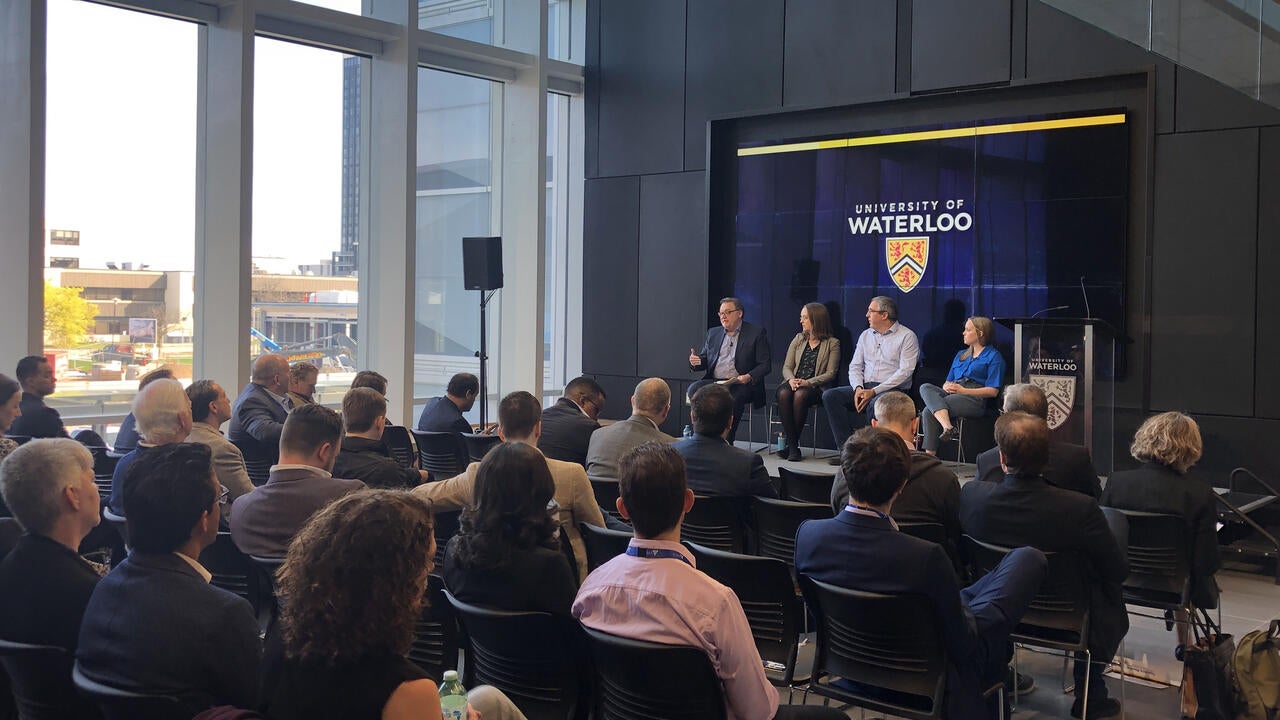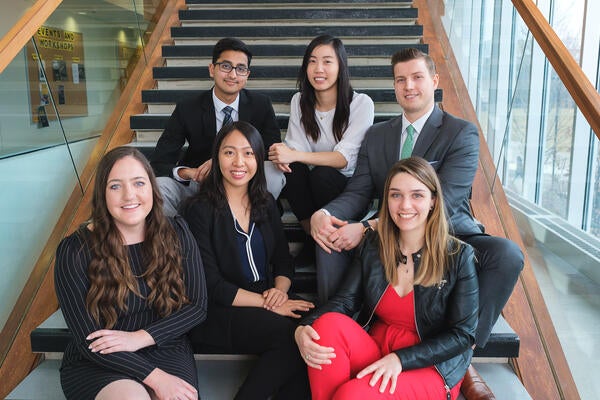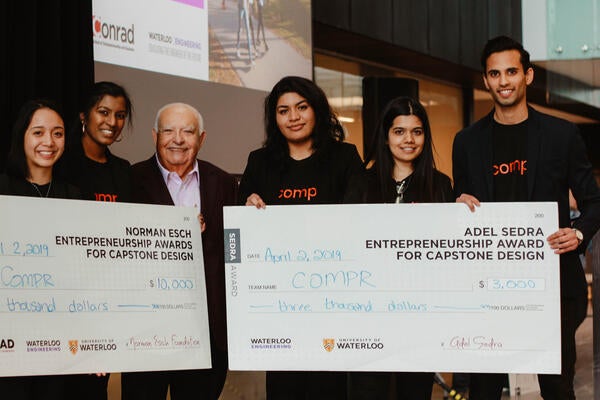
Waterloo welcomes the Young Presidents’ Organization
Global leaders share how industry benefits from partnerships with academic and startup ecosystems

Global leaders share how industry benefits from partnerships with academic and startup ecosystems
By Stephanie Longeway University RelationsOn May 15, the University of Waterloo welcomed the local chapter of the Young Presidents’ Organization (YPO) for an immersive experience exploring the link between entrepreneurship, experiential learning and transformative research.
The morning began in Engineering 7 with a panel moderated by Murray Gamble (BASc ’85), vice-chair of Waterloo’s Board of Governors. He led a discussion that brought together a quantum computing scientist, an industry leader in research and development (R&D) and a chief executive officer for one of the largest accelerator programs in the world. They had a lot more in common than you might think.
The discussion focused on connecting emerging talent, technology and research with key industries and sectors to drive positive disruption. And the key to innovating with impact? Forming strong global partners.
“We have built a network of collaboration with businesses and organizations from around the world,” said Feridun Hamdullahpur, president and vice-chancellor of Waterloo, in his opening remarks.
He explained that these partnerships have served as the backbone of Waterloo’s co-op program that employs more than 22,000 students every year. The program is the largest of its kind in the world and is a vital talent pipeline for countless organizations in industry ranging from tech to public accounting.
Jennifer Stanley (BMath ’98) is the senior manager of R&D at OpenText and a Waterloo alumnus. When Stanley was a student in Waterloo’s Faculty of Mathematics, she gained valuable experience as a developer, but commented that she regrets not doing co-op. Stanley now advocates for hiring co-op students and explained the advantages to the other industry leaders in attendance.
“Co-op students help us with our projects and help us meet our deadlines. But what I appreciate the most is that they question what we are doing. They help find solutions and bring fresh ideas.”
Stanley noted that as an employer, she values co-op as a good feeding program for future talent. “In several cases, students will join us full-time when we they are done,” she said.
Paul Salvini (BMath ’92) is the CEO of the Accelerator Centre and associate vice-president of research commercialization at Waterloo. He told the young presidents that he believes the co-op program can inspire entrepreneurship.
“We make it easy for students to find jobs [through the co-op program], so why would they want to start their own businesses?” Salvini asked the audience. “Because working in industry inspires you to create.”
He explained that the co-op program helps “de-risks” entrepreneurship because students gain relevant industry experience and clarity of what the marketplace looks like. They can then be inspired to contribute and create. Salvini noted that the University’s entrepreneurship ecosystem offers other programs, like Velocity, that provide startups with the encouragement, facilities and funding support they need to get their ideas off the ground.
The supports are there, “it’s just up to the imagination of the researcher,” said Salvini.
Kristine Boone is a Waterloo PhD candidate and expert in quantum computing. She has seen first-hand how research breakthroughs can make a big impact in industry. Boone applies her research to real-world cases at Quantum Benchmark, a startup dedicated to eliminating errors in quantum computing. She explained that joining Quantum Benchmark lets her see her work in action.
“I realized there was a market for the kind of software I develop,” said Boone. She went on to explain, “it’s exciting to use my research this way and see exactly how it can be used immediately.”
Boone also credits Waterloo’s entrepreneurship ecosystem for this success. She notes that there are 14 quantum computing startups that have spawned from Waterloo’s Institute for Quantum Computing. “There are only like 30 quantum startups in the world … it is incredible that half have come from here.”
President Hamdullahpur introduced the GEDI initiative launching at Waterloo later this spring. GEDI is a program unique amongst universities in Canada and around the world. Its goal is to help to create dynamic links between the University, industry and disruptive startups to unlock the potential for emerging talent and innovation.
Sandra Banks, vice-president of University Relations at Waterloo, explained GEDI as a gateway for business to harness the full innovation capacity of the University. She told the crowd, “it is a simplified one-stop shop to address your business concerns.” Industry leaders can connect with co-op students, as well as researchers and dynamic teams, to solve for business solutions.
Following the panel discussion, YPO members went on a campus tour visiting innovation hubs like Engineering 5, the Tatham Centre and the Mike & Ophelia Lazaridis Quantum-Nano Centre.

Read more
Find out which life-changing ideas earned three grad students a share of $35K and entrance in the Velocity Garage

Read more
From printing 3D kidneys to helping pregnant women in Uganda, meet the students making a difference while building a career

Read more
Six teams of engineering graduates hope to turn their fourth-year design projects into viable businesses
The University of Waterloo acknowledges that much of our work takes place on the traditional territory of the Neutral, Anishinaabeg, and Haudenosaunee peoples. Our main campus is situated on the Haldimand Tract, the land granted to the Six Nations that includes six miles on each side of the Grand River. Our active work toward reconciliation takes place across our campuses through research, learning, teaching, and community building, and is co-ordinated within the Office of Indigenous Relations.